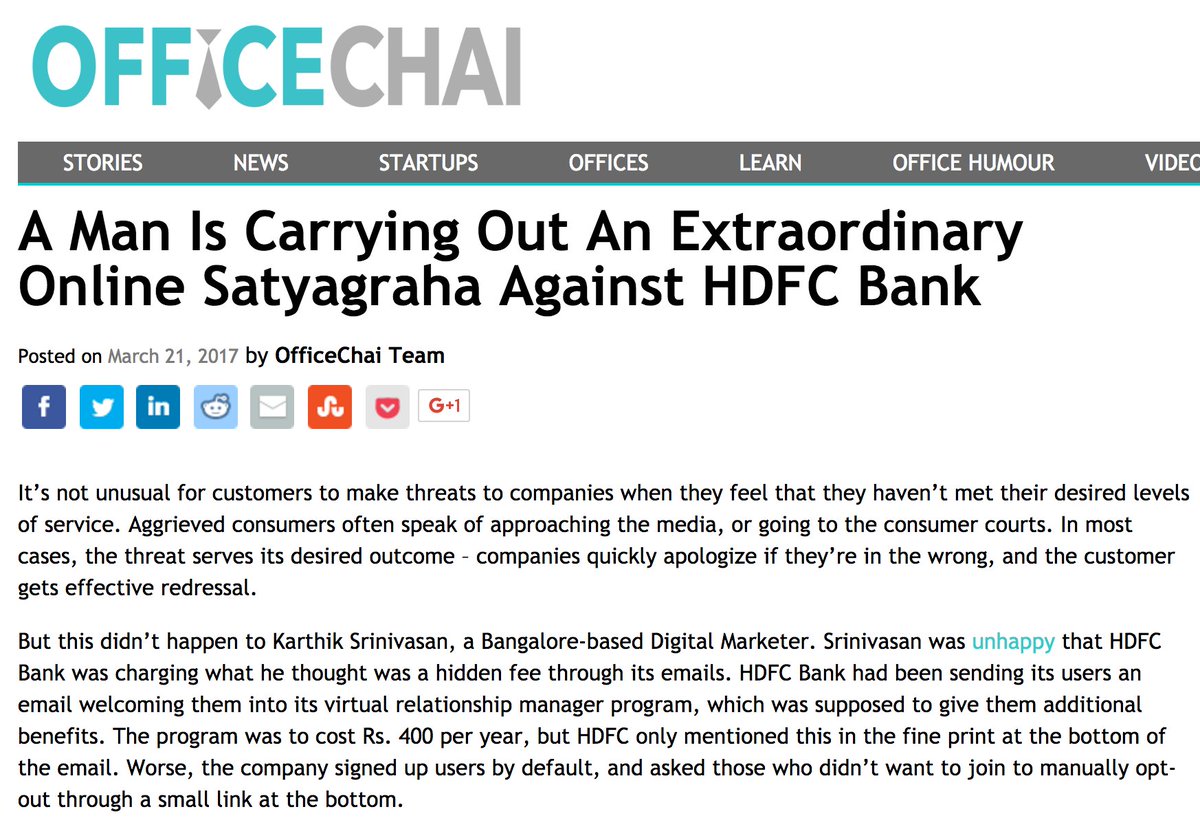Karthik Srinivasan, a Digital Marketer from Bangalore was going through his email when he discovered that HDFC Bank had been charging him Rs 100 per quarter for a program he never signed up for.
On delving deeper, he discovered that the service was an opt-out program that had been activate for his account without his express consent. Worse still, the opting out requires a member to actually read their spam-like banking emails, from top to bottom, discover the fine print that states that the offer is an opt-out one and then click on a link to opt-out of the service.
@beastoftraal write to banking ombudsman, an opt out program is not permitted I think @kalyansury @HDFC_Bank@HDFCBank_Cares
@MystiqueWanderr Planning to. Meanwhile, plan to tweet it *every single day* till end 2017 or till @HDFC_Bank apologizes to all. @kalyansury
But what’s Rs 400, right? That still doesn’t equate to hundreds of crores of rupees.
Rashmi R. Padhy took to Medium to break down why the money is real and why this is indeed a scam.
Pointing to VAS (Value-Added-Service) fraud that was prevalent some years ago, Padhy notes that telcos used to offer VAS as “free” trials. After the trial was over, these telcos would charge you for the service and keep doing so until you opted out.
The value of the transactions was small, but scaled up, the telcos likely earned in hundreds, if not thousands of crores. The rising number of complaints caught the Telecom Regulatory Authority of India’s (Trai) attention and the practice was halted.
Day 16: Why Day 16? And why I’ll be tweeting this to @HDFCBank_Cares *every single day* till the end of 2017: http://bit.ly/2jW2NeJ
Day 17: I’m not tired @HDFC_Bank! Just very disappointed. That a bank could be this brazen with customers’ money http://bit.ly/2jW2NeJ
HDFC Bank appears to be doing the same thing. The bank essentially upgrades you to a free Classic / Preferred Banking trial program without your consent and then charges you Rs 100 — plus service tax — per quarter till you opt out.
Since most people would not read the mailer that explains all this and since the price isn’t placed up front, most people will not opt-out because they simply don’t know.
Padhy breaks down the calculations as follows. Charging 1.2 Cr customers a fee of Rs 400 a year, HDFC is set to earn upwards of Rs 400 Cr a year. For free, without the explicit consent of its members.
The calculation may not be as cut and dried as Padhy puts it and the numbers might be much lower. This doesn’t, however, change the fact that the program is inherently fraudulent. And other banks might soon follow suit, if they haven’t already.
As heinous as the practice might seem, it is currently perfectly legal for it to do what it’s doing.
Day 49: Invite-only, they said.
You’ll be charged, they said.
‘Here’s opt-out link’, they hid in email.
If not…! http://bit.ly/UnethicalHDFC
Day 50: Thank you for this @OfficeChai. For the 50th time, could you please do the right thing, @HDFC_Bank? http://bit.ly/2nGeeum pic.twitter.com/euk7nuMgpl
Most people may not even be aware of the service or the charge. A charge of Rs 400 a year can easily get lost in the tens of thousands of transactions that we perform every year. And how many of us actually peruse through our monthly bank statements in that much detail anyway? Many more of us probably delete bank mails the moment they arrive in the first place.
Srinivasan did not take this charge laying down. On discovering the charge, an average person might simply have opted out, vented a bit on social media and left it at that. Srinivasan is, however made of more Gandhian stuff. As Office Chai puts it, Srinivasan is now on an online ‘satyagraha’ to get HDFC Bank to apologise for trying to scam its customers in such a way.
Click Here for the detailed full story






